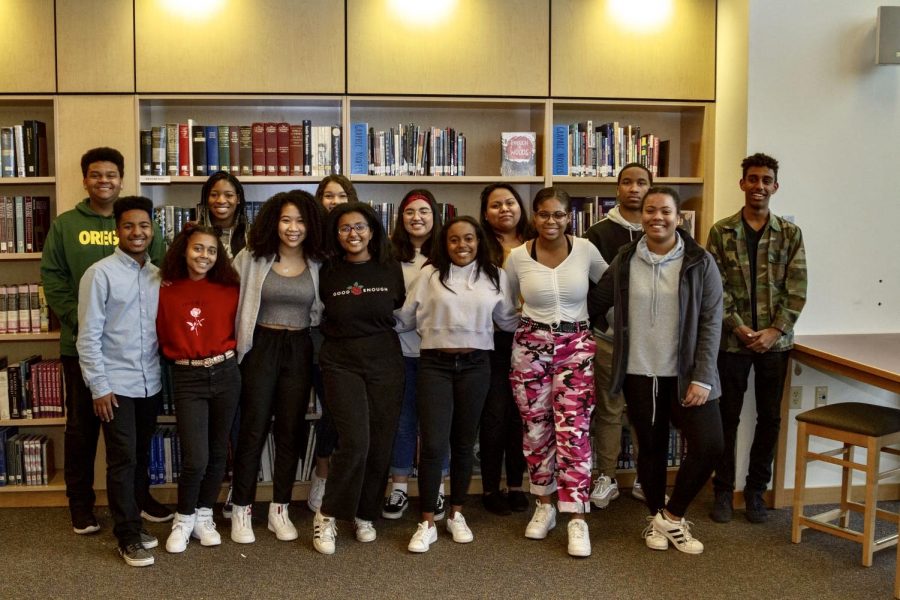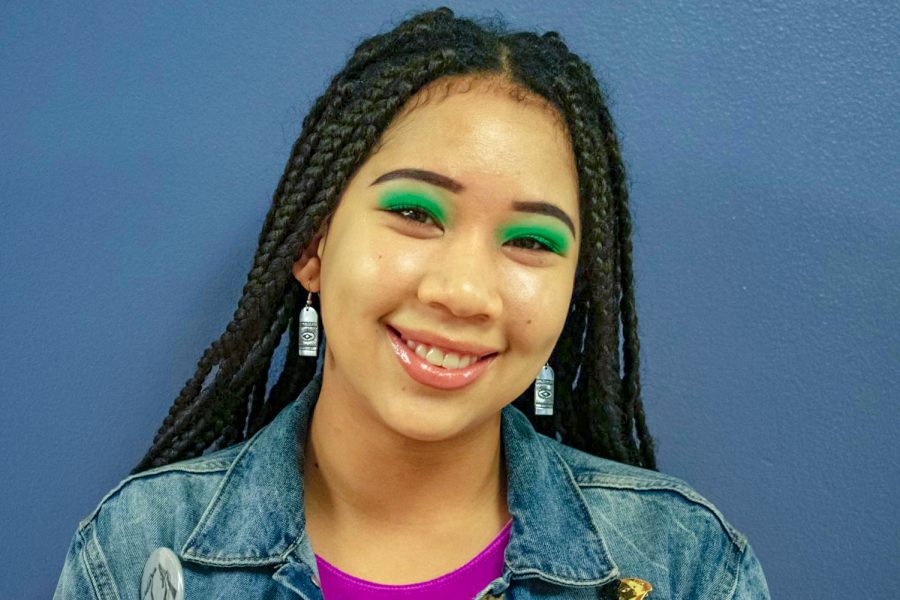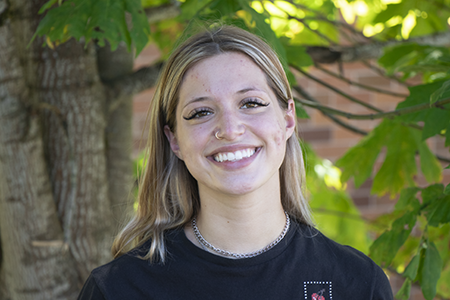Persevering Through Difficulty, Student Activist Amira Tripp Folsom Strives to Make a Difference in Her Community
Earlier this school year, senior Amira Tripp Folsom worked to register many students as voters.
November 13, 2019
Navigating through high school and finding where you fit in is a challenge many people face. However, it can be especially difficult if, as a freshman, you come in already feeling like an outsider.
Over the course of senior Amira Tripp Folsom’s three plus years, La Salle has been a whirlwind of experiences and emotions for her. She has faced feelings of marginalization, but has used her experiences to speak out and make a positive change in the community.
Tripp Folsom has participated in and led many events, clubs, and groups involving activism in and outside of La Salle, including Next Up, REP, Democracy Bowl, Black Student Union, and Youth Ending Slavery Club.
At the beginning of freshman year, Tripp Folsom had a difficult time adjusting to the social and religious aspects of La Salle, as well as having a dress code, for she had not yet attended a Catholic school.
“I wasn’t really prepared for the amount of… expectations of students and people already knowing what those expectations were,” she said. “I felt like I was missing something, or I didn’t really know what was going on, because I guess most people who have gone here [have attended] Catholic school for most of their lives.”
Tripp Folsom had attended a variety of different schools before La Salle. “I started off in public school, and I went to a Spanish immersion school, so all of our classes were in Spanish,” she said. “Then I transferred out and went to a charter school, and then I transferred again and I went to [Catholic] school.”
The reason Tripp Folsom transferred to La Salle at the end of eighth grade was that she realized her previous schools had not been working for her, and she felt she was not receiving the quality education she desired.
“I [like] going to school at La Salle because I feel like I’m getting a really good education and that my teachers care for me and my wellbeing,” she said. “We have a lot of great opportunities to explore our interests and La Salle [is] a place for me to grow in passion for social justice and activism.”
Although she enjoys the educational factors of La Salle, Tripp Folsom has struggled with feeling marginalized ever since freshman year, and has experienced racist actions from other students.
“My freshman year was kind of terrible to be honest,” she said. “It was a struggle for me especially to make friends and adapt to my environment, because I wasn’t used to being surrounded by white people twenty-four-seven.”
The past school she attended was much more ethnically diverse, so La Salle was a drastic change due to its predominantly white population.
Tripp Folsom saw a need to create a space for students of color at La Salle.
For a school that prides itself on having an inclusive community, Tripp Folsom felt La Salle was not supportive of its students of color. At times she has felt not welcomed and unsafe at La Salle, resulting in her realizing her differences from other people at school.
“There was a time when I was at a football game and there was this guy who was, maybe like six-foot-six… he was huge,” she said. “And I was this little tiny freshman, and he was just screaming the N-word. And I was just looking up at this guy, and I was like, what the hell am I supposed to do?”
Tripp Folsom was so shocked and scared, she did not do anything about the situation.
This was one of several instances where she did not speak up about her experiences.
“I was constantly scared of being made out to be the angry black person, and the person who always has to bring up race in every conversation, because that was often what the response was that I was [getting,]” she said. “So sometimes I would just be like, ‘okay, I’m just gonna keep my mouth shut, and keep my head down, and not really worry about these people.’”
Another turning point for Tripp Folsom was during Black History Month, her freshman year.
“They didn’t do anything [for] Black History Month, I think the only thing that [La Salle did] was read a quote by Martin Luther King and put up some books by black authors in the library,” she said. “I was just like, okay, I can’t do this anymore and I really thought about transferring, because I was like, ‘is it really worth it?’”
Tripp Folsom was encouraged and inspired to stay at La Salle and try to make a difference by her mom. “She was like, ‘you should see this through and try to make things better, because there are probably other students who are going through the same thing, and it wouldn’t be the right thing to [quit] anytime things get hard,’” she said.
Tripp Folsom started getting more involved in the school community, sharing her voice more widely about the need to embrace more diverse perspectives throughout La Salle.
She helped organize empathy week at La Salle, the school theme week focusing on diversity and inclusion that took place in April.
During this week, there was a student-led empathy assembly, where students from diverse backgrounds, including Tripp Folsom, spoke about their experiences at La Salle. “It was really good to see students of color, being able to share their stories in front of the whole school and not feel like… they have to go through it on their own,” she said.
Tripp Folsom feels better about La Salle now, than she did entering it. “I feel confident in the systems that I and other students of color have established like affinity groups, [and] the [Diversity, Equity, and Inclusion] support staff who is there to advocate for the students of color here,” she said.
The three new affinity groups that were started at La Salle last year are Asian/Pacific Islanders Club, Black Student Union, and Unidos en Poder. Tripp Folsom formed the Black Student Union, with now senior, Mary Gach. Tripp Folsom is currently the president and a student leader of the BSU at La Salle.
“The best way to eliminate ignorance in yourself is to put yourself out of your comfort zone and spend time with people that you have biases about,” she said. “As the BSU, we kind of want to invite people in and…. share these really special parts of ourselves, while [also creating] space and time for ourselves as well.”

The Black Student Union is featured in a photo from last school year.
One of the happiest moments of Tripp Folsom’s experience this year with the BSU was when an underclassman expressed great interest in working with the BSU. “A freshman came up to me, and he was like, ‘I want to be as involved in BSU as possible’, and that made my heart explode,” she said.
In the future, Tripp Folsom hopes the BSU will plan more events celebrating black culture, and help La Salle celebrate diversity altogether.
Tripp Folsom also started the Youth Ending Slavery Club sophomore year, for she is very passionate about history and interested in how it repeats itself.
“As a black person, I know a lot of my history is rooted in slavery,” she said. “And so, as I started to educate myself more, it was really astounding to me that slavery is still happening today, in different ways.”
The club focuses on raising awareness about modern day slavery, through things such as bake sales to raise money, and educating the community.
“Obviously, we’re all teenagers, it’s not like we’re going to go out and fight human traffickers, you know, [or] break into sweatshops and stuff and set things on fire,” she said. “[But] I was like what can I do to help?”
Tripp Folsom also said that she helped push for La Salle’s new staff member focusing on diversity, equity, and inclusion, Mr. Andrew Yoshihara. “This [was] something that I was pushing for, since my freshman year, was [to get] a diversity, equity and inclusion [staff member],” she said.
Tripp Folsom is very appreciative that Mr. Yoshihara is at La Salle. “[He] has been so supportive, and helpful, and we feel like we have a person who understands what we’re going through,” she said. “He knows what it’s like, and is on our side, and is completely in our corner, and [he] is there to make sure that everything is okay.”
Outside of La Salle, Tripp Folsom actively works with the group Next Up. Through Next Up she participates in REP, which stands for Re-innovate, Prevent, and Evolve, and Democracy Bowl.
Tripp Folsom is mainly an activist for voting rights and the anti-gun violence movement. “Not just mass shootings, but other types of gun violence, like everyday gun violence, and suicide,” she said. “[We are working] to move the conversation about gun violence to include more people, and not leave people who are the most marginalized out of the conversation.”
Tripp Folsom got involved with Next Up though Teen Council, which was another non-profit she was working with around the time of the Parkland, Florida shooting.
“The executive director was like, ‘hey, this organization is planning a walkout and I think that you would be really into that, so I’m going to put you in contact with the people that are planning it,’” she said. “I was just really excited about that and I wanted to help. It was a statewide walk out, with REP and their non-profit [of] Next Up… and [I] just kind of stuck with it afterwards.”
REP is a collective group of high school students from the Portland metro area that hold community events, table and offer trainings to “to change the narrative around gun violence to center racial equity, voices of people of color.”
Tripp Folsom credits her advocacy in this area as one of the reasons that she is at La Salle today.
“The whole reason I’m going to La Salle, is because I’m on this scholarship and we had to write an essay about like, what’s the most pressing issue in America today and I wrote about gun violence,” she said. “So it’s kind of been like a part of my life for a really long time.”
In addition to advocating against gun violence, Tripp Folsom is also passionate about the right to vote.
“With voting rights, I think it’s really important to make sure that everybody who can vote should be voting, and even people who cannot vote, but should, have the right to vote, I feel like their rights should be advocated for,” she said. Tripp Folsom pointed out that in certain states if you are convicted of a felony then you lose your right to vote.
“[This] is a huge way of disenfranchising black people, especially with the war on drugs and mass incarceration, it was like killing two birds with one stone essentially,” she said. “[It’s like] ‘Okay, we’re going to incarcerate all of these people, and then we’re going to make sure that they can’t vote either once they get out.’”
Tripp Folsom has put in a lot of work to make sure youth are voting. She has led Democracy Bowl last year, and again this year at La Salle. Democracy Bowl, organized by Next Up, is a competition to see who can register the most voters at their school.
Tripp Folsom and other students who were helping organize Democracy Bowl went around to all the social studies classes in the school. “I think we registered over…. 200 people,” she said. “It was a lot of work, but I think it was worth it, because simply by pre registering, it increases your chances of voting by so much.”
A while ago Next Up helped make voter pre registration for sixteen and seventeen year olds a reality, and heavily supported Oregon’s move toward paid ballot postage.
“Although you can vote by mail, the government originally didn’t pay for stamps, which was a barrier for a lot of people who are of lower income,” she said. “So just like being able to get people to vote [in] whatever ways we can.”
Along with other La Salle students, Tripp Folsom is also working to try to lower the voting age to sixteen. Through working with Next Up, she gets to see what other activists from other parts of the country are going to help get this issue passed. “It’s a huge, uphill battle, and I think that it’s worth it,” she said. “I think that it could solve a lot of the problems that have led to young people having the lowest voter turnout.”
In the future, Tripp Folsom wants to continue advocating for social justice, and she is looking at majoring in economics or international affairs. “I know that there’s a lot of things that I can do with that major,” she said. “I could go to law school, and become a civil rights lawyer, or something that I’m really interested in is micro lending.”
She is looking a multiple colleges to continue her education, including Barnard College, Princeton University, Howard College, the University of Oregon, and the University of San Francisco
“I think no matter which school I go to, it’ll work out, because it’s really about the person and not the institution,” she said. “If you’ve got that work ethic and the drive, you can be successful anywhere.”
Once Tripp Folsom leaves La Salle to continue her journey in life, she has faith in the younger generation of students to follow in her footsteps, continuing her quest of making La Salle a more diverse and welcoming place for students of color.
Tripp Folsom encourages other students to speak out about injustices they see at the school.
If you are wishing to get more involved in activism, and interested in Next Up, Vote 16, REP, BSU, or Youth Ending Slavery, feel free to talk to Tripp Folsom, she is more than welcome to help you get connected.
“[La Salle] has a lot of resources and there are a lot of people who are probably in your corner and rooting for you,” she said. “So if you really see something that is unjust, or something that you believe is wrong, whether it’s a really restrictive dress code, or their policies, you should know that no matter what, you standing up and using your voice is the right thing to do.”






Ava Whalon • Nov 14, 2019 at 5:16 pm
so inspired by all that Amira is, it’s people like her that shows exactly the incredible change our generation is going to make.